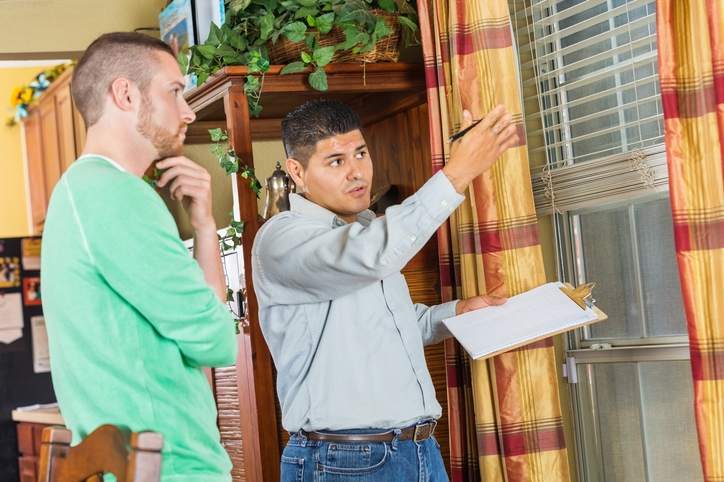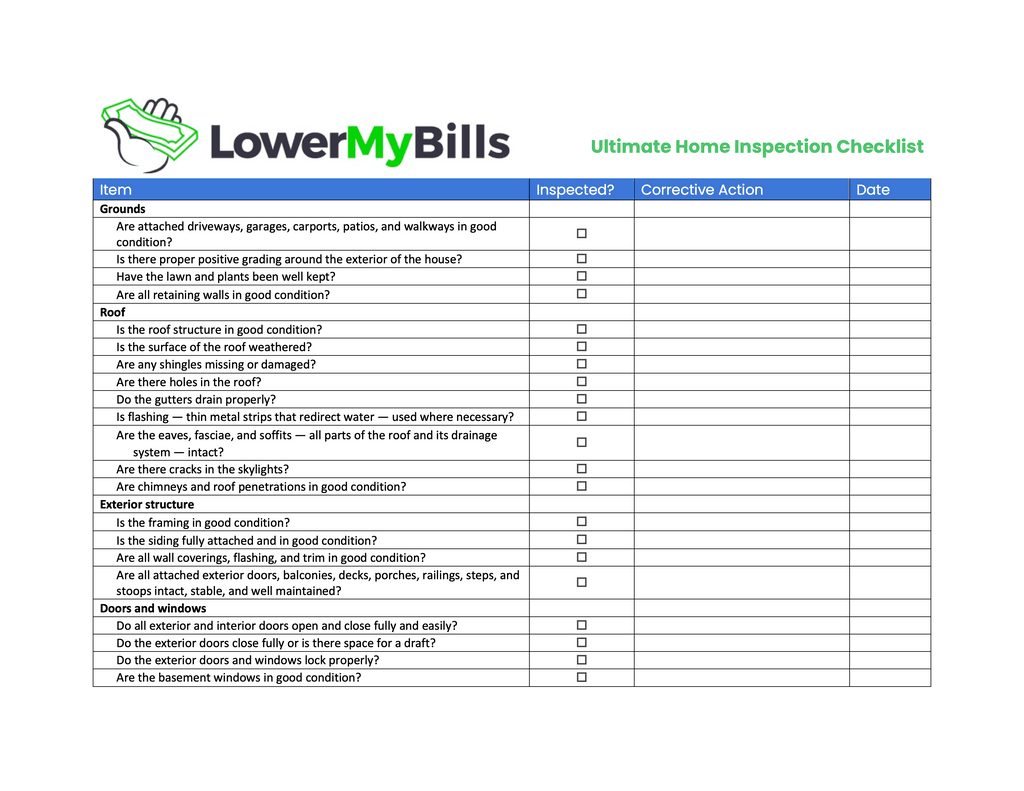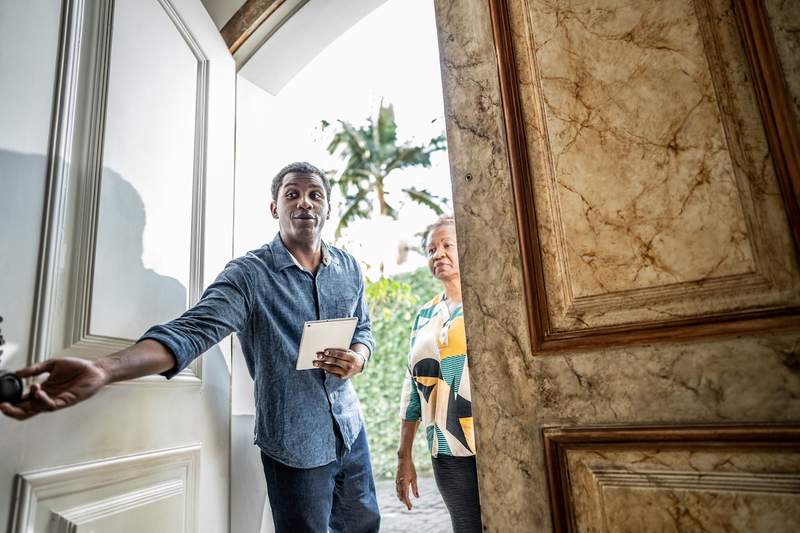So, you’ve fallen in love with a home that’s just right for you and made an offer that the seller has accepted. You’re so excited to get to the finish line that you find yourself tempted to breeze past the home inspection phase — or skip it altogether.
While that’s understandable, it also could be a costly mistake. The home inspection is one of the most important steps in buying a house. It gives you a deeper understanding of the condition of the home, including what needs to be repaired, what’s required to maintain it, and whether you need to walk away from the deal.
It’s important to be thorough, which is why having a home inspection checklist will help you get answers to all your questions.
Key Takeaways:
- A home inspection is a comprehensive assessment of a property’s condition from a certified third-party professional.
- Take time to find an experienced home inspector, and understand exactly what will be inspected and what the service will cost.
- The inspector examines the home inside and out, including the roof, foundation, siding, overall structure, interior, appliances, heating and cooling systems, internal plumbing, and electrical infrastructure.
Home Inspection Basics and Process
A home inspection is an objective evaluation of what’s likely the biggest purchase you’re ever going to make. It usually is conducted shortly after the seller accepts your offer and both parties sign a purchase and sale agreement.
“Home inspections take emotion out of the equation and offer an unbiased view of the property,” says Stacy Bergman, owner and inspector at Shut The Front Door Home Inspections, which serves Westchester, Putnam, and Dutchess counties in New York, and Fairfield County in Connecticut.
What is a home inspection?
A home inspection is a top-to-bottom examination of a property’s physical condition, systems, and grounds. Inspectors are licensed at the state level to ensure an accurate, independent, and complete evaluation of the property’s condition. Unlike a home appraisal, a home inspection does not concern itself with the market value of the home.
A home inspection is visual and noninvasive, so the inspector might pass over areas of the property that are inaccessible or unsafe to view.
Most lenders require a home inspection as part of the application process for most types of mortgages.
When should I get a home inspection?
After you make an offer on a home and the seller accepts, both parties sign a purchase and sale agreement. The home inspection usually is scheduled as soon as possible after the agreement has been signed. This gives you the most time before closing to work with the seller if the inspector discovers problems.
How much does a home inspection cost?
Fees vary depending on the property and its location, but expect to spend $300 to $500 for a home inspection. The inspection fee is generally considered part of the closing costs.
How long does a home inspection take?
The average single-family home inspection takes two to four hours to complete. But that may vary depending on the property type — say a condo vs. townhouse vs. single-family home — and how large the home or property is, Bergman says.
Do I need to be there for the home inspection?
You should be present for the home inspection, but you don’t have to be if you don’t want to. Karen Parnes, a real estate broker and business consultant in Rockville, Maryland, recommends all prospective buyers walk through the property with the home inspector.
Why do I need a home inspection?
The home inspection is an opportunity to learn more about the property. It should give you a heads-up about maintenance requirements and any potential problems that may affect your decision to buy the home. Knowing more about the property also can reduce the stress of homebuying.
“Not everyone is looking to buy a perfect home, but it’s important to know the cost of keeping the property in good, livable condition,” Parnes says.
“It’s a chance to get educated, learn how to maintain the property, and know where the safety features are — like the main water shut-off valve,” Bergman adds.
If you have an inspection contingency in your purchase and sale agreement, the inspection is even more essential. If defects are found, it allows you to ask the seller to make repairs or to lower the sales price so you can pay for the repairs yourself. It also empowers you to walk away from the sale if the problem cannot be resolved.
Do I need an inspection contingency?
In your purchase and sale agreement, the inclusion of an inspection contingency tells the seller that you will only proceed with the transaction if you are satisfied with the home inspection. Should the inspection reveal damage or defects, this contingency lets you cancel the deal and get back your earnest money deposit.
Some buyers waive the home inspection contingency to make their offer more attractive, especially in a bidding war. This is a risky move because you would have to pay for any repairs discovered after the sale closes. If the damage is significant, it will be expensive to fix.
What happens if I buy a home as is?
Some homes are listed for sale “as is,” which means the seller won’t make repairs, you either take it or leave it.
Sellers may list the home as is if they can’t afford to pay for repairs, or if they want to sell quickly. Either way, you have no guarantee that everything in the home is functional, so you need a home inspection to know what you’re signing up for and to reduce your financial risk.
What may seem like a great deal on the surface could end up costing thousands in repairs after you move in. If you’re considering buying a home as is, a thorough home inspection is essential.
How To Find a Home Inspector
While it’s easy just to go with a referral from your real estate agent, you should do some vetting on your own to find a qualified inspector. Here are some tips:
- Learn your local inspection requirements. Home inspection standards vary by state, so understanding what standards your home must meet is a good place to start.
- Check the inspector’s credentials. States require inspectors to be licensed, so check your inspector’s professional standing. You also can look for certification from a professional home inspection organization, such as the American Society of Home Inspectors, the International Association of Certified Home Inspectors, or the National Academy of Building Inspection Engineers.
- Look up online reviews. You can search for reviews through the Better Business Bureau, Angi (formerly known as Angie’s List), Yelp, or Google Business Profile (formerly known as Google My Business).
Watch out for home inspectors who fail to answer important home inspection questions or don’t spend enough time reviewing each property.
What To Expect on Inspection Day
The inspector may arrive an hour early to examine exterior features, such as the roof, foundation, and structure. It’s a good idea to ask your home inspection questions before the interior inspection, so do your homework and show up prepared, Bergman says.
Inside the home, the inspector will check all the rooms in the house, as well as the appliances, heating and cooling systems, plumbing, and electrical system. This is your chance to learn more about what’s happening inside the home, so take note of any general recommendations.
“We can offer routine maintenance tips that may be helpful for first-time homeowners,” Bergman says.
After the home inspection, you’ll have another chance to ask questions. This is the time to ask about anything that came up during the inspection or to get clarification on anything the inspector said.
Your Home Inspection Checklist
While every inspection is different, most homes have similar systems and components. The American Society of Home Inspectors provides full guidelines for inspectors, which are summarized below.
Here’s a home inspection questions checklist of what to look for during the home inspection:
Grounds
- Are all attached driveways, garages, carports, patios, and walkways in good condition?
- Is there proper positive grading around the exterior of the house?
- Have the lawn and plants been well kept?
- Are all retaining walls in good condition?
Roof
- Is the roof structure in good condition?
- Is the surface of the roof weathered?
- Are any shingles missing or damaged?
- Are there holes in the roof?
- Do the gutters drain properly?
- Is flashing — thin metal strips that redirect water — used where necessary?
- Are the eaves, fasciae, and soffits — all parts of the roof and its drainage system — intact?
- Are there cracks in the skylights?
- Are chimneys and roof penetrations in good condition?
Exterior structure
- Is the framing in good condition?
- Is the siding fully attached and in good condition?
- Are the wall coverings, flashing, and trim in good condition?
- Are the attached exterior doors, balconies, decks, porches, railings, steps, and stoops intact, stable, and well maintained?
Doors and windows
- Do all exterior and interior doors open and close fully and easily?
- Do the exterior doors close fully, or is there space for a draft to blow through?
- Do the exterior doors and windows lock properly?
- Are the basement windows in good condition?
Basement
- Is the foundation in good condition?
- Is there sufficient ventilation and drainage?
- Is the sump pump working?
- Is there evidence of moisture?
- Is there water damage?
Crawl space
- Is there any damage to the subflooring?
- Is the ventilation and insulation sufficient?
- Is there any evidence of damage from water, insects, or pests?
Attic
- Are there signs of structural damage?
- Is the ventilation and insulation sufficient?
- Are exhaust ducts, exhaust fan vents, end louvers, and electrical splices in good working condition?
Electrical system
- What is the predominant branch circuit wiring method?
- What is the amperage rating of the service?
- Where are the main disconnects and subpanels?
- Where are the smoke and carbon monoxide alarms? Are there enough of them?
- Are the service entrance conductors, cables, and raceways in working condition?
- Are there exposed electrical splices?
- Are the installed lighting fixtures, receptacles, and switches working?
Bathrooms
- Are any bathroom fans working?
- Do the toilets flush completely?
- Are all faucets and showerheads working?
- Do all sinks, bathtubs, and showers drain fully?
- Is the shower and tub caulking in good condition?
Plumbing
- Do all interior water systems work?
- Are all faucets and fixtures in working condition?
- Is there any evidence of leaks or dripping faucets?
- Does the water heater work?
- Is the hot water supply adequate?
- Is the water pressure sufficient?
- Where is the water shut-off valve?
- Are the interior drains working?
- Are all vents clear and functional?
- Are the sewage ejectors, sump pumps, and related pipes in working condition?
- Are all interior water supply, drain, vent, and waste piping materials in good condition?
- Are the fuel storage and distribution systems working?
- Where is the fuel shut-off valve?
Cooling and heating systems
- Is there central air conditioning? Does it work?
- How is the cooling system powered?
- Is there heating equipment installed? Does it operate properly?
- How is the heating system powered?
- Is the thermostat in good working condition?
- Are the vents in good working condition, and is there sufficient ventilation?
- Are the air filters clean?
- Where are the access panels?
Kitchen
- Do the kitchen fans work?
- Are the countertops and cabinets in good condition?
- Are the appliances working? This may include:
- Ovens.
- Ranges.
- Dishwashers.
- Microwave ovens.
- Garbage disposers.
- Are the faucets and sprayers working?
- Do all sinks drain fully?
- Where is the water shut-off valve, and is it working?
- Garbage disposers.
Interior rooms
- Are all ceilings, floors, and walls in good condition?
- Are all stairways, steps, and railings in good condition?
- Are all cabinets, countertops, shelves, and bookcases in good condition?
- Do the garage doors work? Do you know how to operate them?
Miscellaneous
- Are the laundry exhaust systems working?
- Are there vapor retardants in unfinished spaces?
- Are the fuel-burning fireplaces, stoves, and fireplace inserts functional?
Check out our free home inspection checklist sheet.
What’s Not Covered By the Home Inspection?
A home inspection is a visual examination. Inspectors can’t spot defects hidden behind walls and under floors, and they don’t look at certain aspects of a home.
Some common exclusions are:
- Pest issues.
- Swimming pools.
- Indoor air quality.
- Venting equipment for home appliances.
- Asbestos.
- Radon and air quality.
- Lead paint.
- Mold.
- Sewer lines.
- The ground beneath the home.
It can be worth hiring additional professionals to inspect for these problems if you’re concerned about something specific. For example, if you’re buying a home built before 1978, checking for lead paint might be a good idea.
The Home Inspection Report
The home inspection report will explain the property’s condition in detail, including major problems, safety concerns, and maintenance needs, Bergman says. Expect to receive a copy of the inspection report 24 to 48 hours after the inspection.
The report likely will include photos of the property and of specific defects that were found.
Home inspection terms to know
The report may use these terms to describe the home’s condition:
- Material defect: This refers to a specific issue with one of the home’s systems or components that could reduce the property’s value or compromise the residents’ safety.
- Major or minor defect: This means one of the home’s systems or components doesn’t work or could be unsafe. Many inspectors leave it up to the buyer to decide what defects are major or minor. A professional contractor may be required to evaluate the problem further.
- Cosmetic defect: The home has a superficial blemish or flaw that does not affect its functionality or safety.
Bergman recommends buyers read the home inspection report carefully. If the report finds major problems with the home, you may decide to invoke your inspection contingency and cancel the sale. You also may want to use the report to renegotiate the price of the home, or ask the seller to make or pay for repairs.
“The home inspection isn’t always about the major defects,” Bergman says. “There may be a lot of smaller issues that could add up.”
Home inspection report vs. seller’s disclosure
A disclosure statement is a form the seller gives the buyer that lists known issues or defects that could affect the home’s value. This may include water damage, termite issues, mold, damage from previous pets, or any relevant matters. The seller should include all details they are aware of that might present future challenges, as these issues could surface during the home inspection.
This disclosure is different from a home inspection, which is an independent examination by a third-party expert. The inspection report may uncover home defects that the seller was unaware of.
Home Inspection Tips for First-Time Buyers
If you’re a first-time homebuyer, it’s important to know what to look for in home inspection experts and the overall process. Here are some tips to keep in mind.
Hire the right home inspector
Your real estate agent or Realtor should be able to refer you to a trustworthy home inspector. You also can ask family and friends for referrals.
When considering an inspector, ask if they belong to the American Society of Home Inspectors, the National Association of Home Inspectors, or the International Association of Certified Home Inspectors. Ask about their skills and experience, as well as their price. Find out what they will inspect and how long it will take. Make sure you can accompany them and ask about what to look for during the inspection.
Understand the inspection findings
Read the inspector’s report and review the findings carefully. There should be a summary as well as detailed sections on what was inspected. Ask questions about anything you don’t understand.
Ask the seller to make repairs or reduce the price
The purpose of the inspection is to make sure you know the condition of the home you’re buying. If the inspector finds problems, you may want to rethink the deal. Having a home inspection contingency clause in the real estate contract allows you to cancel the sale if the inspection finds problems.
If you discover defects that aren’t a deal breaker but may affect the value of the home, you can use the contingency to renegotiate the sale price or ask the seller to make or pay for repairs.
Also, compare the inspection findings with the seller’s disclosure statement to ensure that any problem areas discovered by the home inspector were properly disclosed.
Know what to do if the inspector misses something important
Even with a home inspection, there’s a chance that something important may be missed. For example, an inspector could fail to notice that the vent pipe on the roof is too short, meaning snow could block the vent and allow toxic gases to build up in the home.
Bergman says your contract with the home inspector should include a liability clause that covers such scenarios. “Most inspectors carry errors and omissions insurance and will defer to insurance companies for assistance on resolutions,” she says.
Cover your bases with a seller’s disclosure
If the seller knowingly conceals major problems with the home, you might have legal recourse — as long as you can prove they were deceptive. One way to protect yourself is by asking for a seller’s disclosure statement.
“Some places require sellers to provide a disclosure of major defects in the home,” Bergman says. “If a defect isn’t disclosed, the seller may be liable for the expense.”
If your state requires a seller’s disclosure, you should receive it within a few days of signing the purchase and sale agreement.
Home Inspection FAQ
Here are answers to some frequently asked questions about the home inspection process.
The short answer: yes.
The long answer: Even a modestly sized or small house is a major investment, so you need to know what you’re getting into. Remember, looks can be deceiving. A house that appears to be in pristine condition may be an absolute mess behind the scenes when it comes to the plumbing, electric, or cooling and heating systems. A house inspection helps ensure that you’re getting a fair deal, and you won’t be surprised by major defects that will be expensive to repair.
If you have a home inspection contingency in your real estate contract and the inspection reveals defects that change how you feel about the home, you can cancel the sale and walk away. You’ll usually have around one or two weeks to schedule the inspection, get a contractor to evaluate any defects, and make a final decision.
If there’s a home inspection contingency in your contract, you can negotiate with the seller to cover the cost of any necessary repairs or even renegotiate the price of the home. The appraiser will have valued the property at a certain amount, but if the home inspection reveals serious problems, then you can use the results as leverage. The seller may arrange for the repairs to be completed or agree to renegotiate the sale price to prevent the deal from being canceled.
The Bottom Line on Home Inspections
The home inspection may be something that you’re eager to cross off your to-do list, but it’s critical to pay close attention from start to finish. By working with an experienced home inspector, you’re less likely to find expensive surprises after you move in. No home is free of problems, but by understanding what to expect, you can be prepared before you move in.
Kate Dore, T.J. Porter, and Erik Martin contributed to the reporting of this article.
- Department of Housing and Urban Development
- American Society of Home Inspectors







